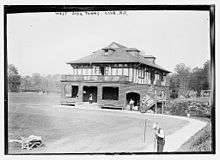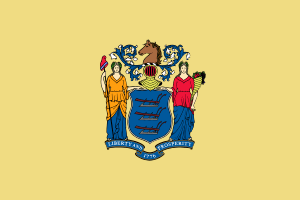West Side Tennis Club
Coordinates: 40°43′11″N 73°50′55″W / 40.719778°N 73.848649°W
 Club in 1912 | |
| Former names | Forest Hills Tennis Stadium |
|---|---|
| Location |
One Tennis Place Forest Hills, Queens, NY, U.S. 11375 |
| Website | |
|
www | |
The West Side Tennis Club is a private tennis club located in Forest Hills, a neighborhood in the New York City borough of Queens. The Club has 38 tennis courts in all four surfaces (clay court, Har-Tru, grass court and hardcourt), a junior Olympic swimming pool and other amenities. It is the home of the Forest Hills Stadium or the West Side Stadium.
It is most notable for hosting the US Open Tennis Championships a total of 60 times, first from 1915 to 1920, and then again from 1924 to 1977. In addition, the finals of the Davis Cup were held at the club 10 times, more than any other venue. The US Pro tournament was held at the venue 11 times, and another big professional tournament, the Tournament of Champions, was held at the venue 3 times. The West Side Tennis Club was the venue of the Forest Hills Tennis Classic, a now-defunct WTA Tour Tier IV event, and a men's challenger event. The Open saw some of its biggest moments and changes while at West Side, including the introduction of seedings in 1927, tiebreakers in 1970, equal prize money for men and women in 1973, and night play in 1975. Currently, the stadium is used as a music venue for concerts.
History


The club was founded in 1892 when 13 original members rented land on Central Park West for three clay courts and a small clubhouse. Ten years later, the land had become too valuable, and the club moved to a site near Columbia University with room for eight courts. In 1908, the club moved again to a property at 238th Street and Broadway. The new site covered two city blocks and had 12 grass courts and 15 clay courts.
The club hosted the International Lawn Tennis Challenge (now known as the Davis Cup) in 1911. With crowds in the thousands, the club leadership realized that it would need to expand to a more permanent location. In 1912, a site in Forest Hills, Queens, was purchased. The signature Tudor-style clubhouse was built the next year.
In 1915, the United States Lawn Tennis Association National Championship, later renamed the U.S. Open, moved to West Side. By 1923, the success of the event necessitated the construction of a 14,000-seat horseshoe-shaped stadium that still stands today. The stadium's first event was the final of the International Lawn Tennis Challenge, which saw the U.S. defeat Australia.
Althea Gibson became the first black player to play in a Grand Slam event in 1950 (in 1957 she became the first black player to win the tournament),[1] and Billie Jean King was the first player to win a Grand Slam event with a metal racket in 1967. In 1968, the year of the first televised broadcast of the US Open,[2] Arthur Ashe became the first black man to win a Grand Slam tournament there.[3]
In 1975, the tournament was switched to Har-Tru clay courts. By 1978, the tournament had outgrown West Side, and the USTA moved the tournament to its new site in Flushing Meadows.[4]
In 2008, the stadium was the site of a women's satellite tournament.[2]
In 2010, the club owners received an offer to raze the stadium and replace it with condominiums.[5] The stadium, called a "crumbling ruin" by WNYC, was in 2011 denied landmark status by the New York City Landmarks Preservation Commission.[2]
Other stadium uses
.jpg)
In addition to tennis, the West Side Stadium was used as a venue for many concerts, including ones by high-profile stars like Linda Ronstadt, Frank Sinatra, The Supremes, Bob Dylan, The Beatles, Jimi Hendrix, The Who, and Donna Summer. This venue was the location for the Forest Hills Music Festival.
The Alfred Hitchcock film Strangers on a Train (1951) was filmed in part during the 1950 Davis Cup finals at the West Side Tennis Club on 25–27 August 1950. A tennis match at the fictitious "Windswept Fields" in the film The Royal Tenenbaums (2001) was filmed at the West Side stadium.
In the summer of 2013, the club was used as the venue for a Mumford & Sons concert. This concert served as a test for the stadium/club to see if the neighborhood would be able to handle such events. Common issues were bad cellular phone connections among other things.
See also
References
- ↑ Long Past the Last Match Point, Debating What’s Next at Forest Hills, New York Times On-line, September 10, 2010
- 1 2 3 Chura, Nate (August 29, 2011). "Ruin in the Forest: A Stadium Once Fit For the US Open Falls Into Disrepair". Retrieved 2013-01-28.
- ↑ Long Past the Last Match Point, Debating What’s Next at Forest Hills, New York Times On-line, September 10,2010
- ↑ Steinberger, Michael (August 23, 2012). "Queens Was Burning, Too: The Chaotic Spectacle of the 1977 U.S. Open". The New York Times Magazine. pp. MM34. Retrieved September 5, 2012.
- ↑ U.S. Open Stadium May Go Condo Wall Street Journal "U.S. Open Stadium May Go Condo" Check
|url=
External links
| Preceded by Worple Road, London Comain Cricket Club, Auckland Kooyong Stadium, Melbourne White City Stadium, Sydney Milton Courts, Brisbane |
Davis Cup Final Venue 1914 1921 • 1922 • 1923 1947 • 1948 • 1949 • 1950 1955 1959 |
Succeeded by Double Bay Grounds, Sydney Germantown Cricket Club, Philadelphia White City Stadium, Sydney Memorial Drive Park, Adelaide White City Stadium, Sydney |
| Preceded by Newport Casino (1881-1914) Germantown Cricket Club (1921-1923) |
Home of the U.S. Open 1915-1920 1924-1977 |
Succeeded by Germantown Cricket Club (1921-1923) USTA Billie Jean King National Tennis Center (1978-present) |
| ||||||||||||||||||


